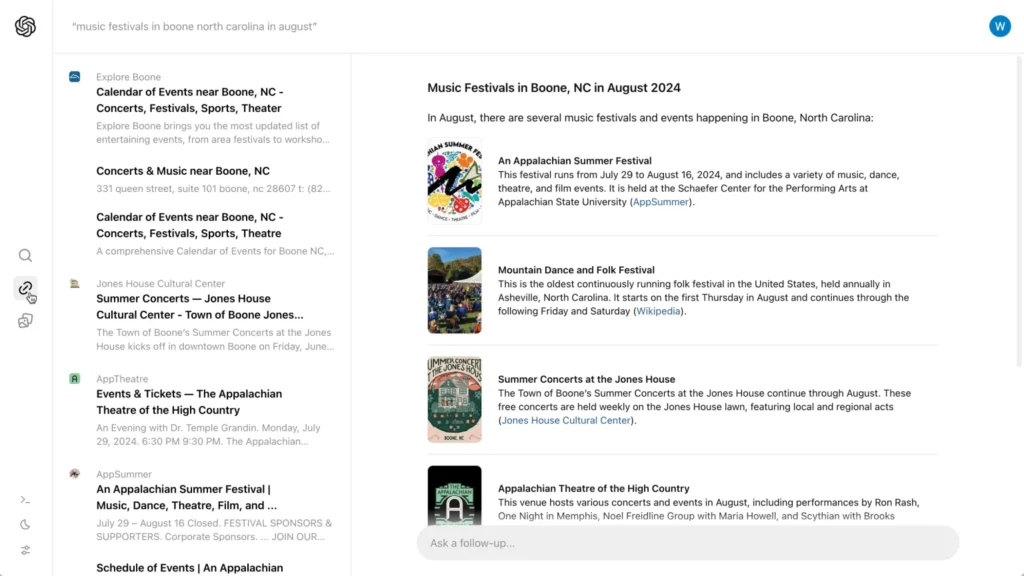OpenAI is setting its sights on revolutionizing the search engine landscape, not only challenging up-and-comers like Perplexity but also taking on giants like Google and Bing. On Thursday, the company unveiled SearchGPT, a cutting-edge search feature designed to deliver “timely answers” by drawing from a vast array of web sources.
Introducing SearchGPT: A New Era of Search
SearchGPT offers a familiar yet enhanced user interface, reminiscent of OpenAI’s chatbot platform, ChatGPT. Users can simply type in a query, and SearchGPT responds with information and images sourced from the web, complete with links to relevant sources. This interactive experience allows users to ask follow-up questions and explore related searches through a convenient sidebar.
Location-Aware Searches for Precision
Some queries take advantage of location data. According to OpenAI’s support documentation, SearchGPT “collects and shares” general location information with third-party search providers to refine the accuracy of results, such as displaying nearby restaurants or local weather forecasts. Additionally, users can opt to share more precise location details via a settings menu toggle.
Powered by Advanced AI Models
SearchGPT is powered by OpenAI’s latest models, including GPT-3.5, GPT-4, and the advanced GPT-4o. Described as a prototype, SearchGPT is launching today for “a small group” of users and publishers, with a waitlist available for those eager to join. OpenAI also plans to integrate some of SearchGPT’s features into ChatGPT in the future.
“We believe that by enhancing the conversational capabilities of our models with real-time information from the web, finding what you’re looking for can be faster and easier,” OpenAI stated in a blog post, highlighting the aim to streamline the often cumbersome process of web searches.

The Competitive Landscape: A Bold Move Amidst Controversy
Rumors of OpenAI’s ambition to launch a “Google killer” have circulated for some time, with reports in February hinting at a product or pilot in development. However, the launch of SearchGPT comes at a contentious time, as AI-powered search tools face criticism for issues like plagiarism, inaccuracies, and content cannibalism.
Recent missteps by other AI search tools underscore the challenges in this space. Google’s AI Overviews suggested bizarre solutions like putting glue on a pizza, The Browser Company’s Arc Search inaccurately claimed that cut-off toes could regrow, and Genspark irresponsibly recommended weapons for violent use. Perplexity was also caught copying news articles from outlets like CNBC, Bloomberg, and Forbes without proper credit.
AI-generated summaries are seen as a threat to website traffic, with studies indicating that tools like AI Overviews could diminish publisher traffic by about 25% due to reduced emphasis on article links.
A Responsible Approach to AI-Powered Search
In light of these concerns, OpenAI is positioning SearchGPT as a more responsible and measured solution. The company emphasizes that SearchGPT “prominently cites and links” to publishers with “clear, in-line, named attribution.” OpenAI is also collaborating with publishers to shape the search experience and offering tools for website owners to control how their content appears in search results.
“Importantly, SearchGPT is about search and is separate from training OpenAI’s generative AI foundation models. Sites can be surfaced in search results even if they opt out of generative AI training,” OpenAI clarifies. “We are committed to a thriving ecosystem of publishers and creators.”
The Road Ahead for SearchGPT
While OpenAI’s past actions, such as scraping millions of YouTube transcripts without permission, cast a shadow of doubt, the company’s current efforts with SearchGPT signal a commitment to ethical practices. The future of SearchGPT and its impact on the search engine market remains to be seen, but one thing is certain: OpenAI is ready to challenge the status quo.
Stay tuned as the SearchGPT saga unfolds, potentially reshaping how we find information on the web.










